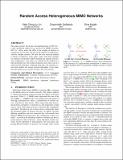Random Access Heterogeneous Mimo Networks
Author(s)
Lin, Kate Ching-Ju; Gollakota, Shyamnath; Katabi, Dina
DownloadKarger_Random access.pdf (587.7Kb)
OPEN_ACCESS_POLICY
Open Access Policy
Creative Commons Attribution-Noncommercial-Share Alike
Terms of use
Metadata
Show full item recordAbstract
This paper presents the design and implementation of 802.11n+, a fully distributed random access protocol for MIMO networks. 802.11n+ allows nodes that differ in the number of antennas to contend not just for time, but also for the degrees of freedom provided by multiple antennas. We show that even when the medium is already occupied by some nodes, nodes with more antennas can transmit concurrently without harming the ongoing transmissions. Furthermore, such nodes can contend for the medium in a fully distributed way. Our testbed evaluation shows that even for a small network with three competing node pairs, the resulting system about doubles the average network throughput. It also maintains the random access nature of today's 802.11n networks.
Date issued
2011-08Department
Massachusetts Institute of Technology. Department of Electrical Engineering and Computer ScienceJournal
Proceedings of the ACM SIGCOMM 2011 conference (SIGCOMM '11)
Publisher
Association for Computing Machinery (ACM)
Citation
Kate Ching-Ju Lin, Shyamnath Gollakota, and Dina Katabi. 2011. Random access heterogeneous MIMO networks. In Proceedings of the ACM SIGCOMM 2011 conference (SIGCOMM '11). ACM, New York, NY, USA, 146-157.
Version: Author's final manuscript
ISBN
978-1-4503-0797-0